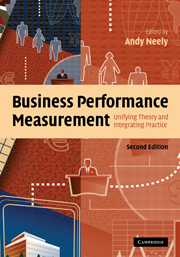Book contents
- Frontmatter
- Contents
- List of figures
- List of tables
- List of boxes
- List of contributors
- Introduction
- Part I Performance measurement – functional analyses and theoretical foundations
- Part II Performance measurement – frameworks and methodologies
- Part III Performance measurement – practicalities and challenges
- Part IV Performance measurement in public services
- Part V Performance measurement – emerging issues and enduring questions
- Index
Part III - Performance measurement – practicalities and challenges
Published online by Cambridge University Press: 22 September 2009
- Frontmatter
- Contents
- List of figures
- List of tables
- List of boxes
- List of contributors
- Introduction
- Part I Performance measurement – functional analyses and theoretical foundations
- Part II Performance measurement – frameworks and methodologies
- Part III Performance measurement – practicalities and challenges
- Part IV Performance measurement in public services
- Part V Performance measurement – emerging issues and enduring questions
- Index
Summary
The first two parts of the book have concentrated largely on measurement theory, although many of the authors have drawn on their practical experiences as well as their research studies. The third part sees a change in tone, focusing primarily on measurement in practice, albeit measurement in difficult areas of practice.
The first contribution, from Tim Ambler and John Roberts, explores measurement from the customer perspective, introducing the concept of marketing dashboards and asking what they should contain. Ambler and Roberts explore the different measures that have been proposed over the years to track marketing performance, arguing that the search for a “silver metric” is somewhat futile. Instead, they call on marketeers to adopt marketing dashboards that reflect the complexity of marketing accountability better.
The second contribution, from Andrew Likierman, explores risk and performance measurement. Likierman reviews the link between measurement and risk from three perspectives: in assessing organizational performance, in managing the organization and in reading the individual. He argues that performance measurement and risk are inextricably linked, on the grounds that discussing performance without reference to risk makes for meaningless comparisons.
The third contribution, from Rob Austin and Pat Larkey, moves firmly inside the organization, and asks how knowledge workers should be measured. This topic is particularly important in the developed economies. There, increasing numbers of firms are finding that they cannot compete on the basis of cost and therefore have to compete on the basis of value delivered. To create value, firms rely on their knowledge workers.
Information
- Type
- Chapter
- Information
- Business Performance MeasurementUnifying Theory and Integrating Practice, pp. 237 - 238Publisher: Cambridge University PressPrint publication year: 2007
Accessibility standard: Unknown
Why this information is here
This section outlines the accessibility features of this content - including support for screen readers, full keyboard navigation and high-contrast display options. This may not be relevant for you.Accessibility Information
- 1
- Cited by
